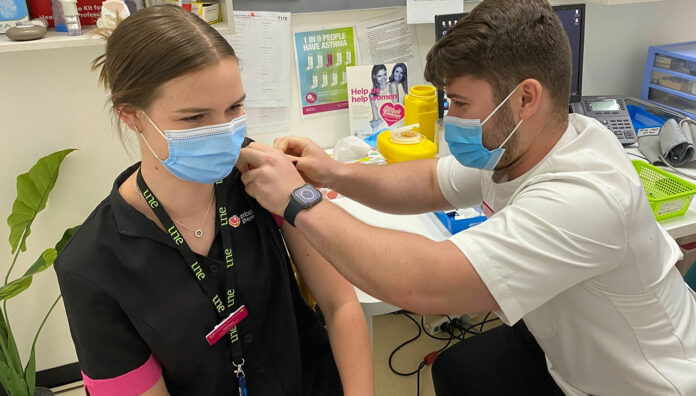From COVID-19 to influenza, pharmacists help to protect millions of Australians through vaccination services. But a lack of funding and access could have ‘dire consequences’ for the nation.
When pharmacy intern Okhan Atasoy MPS encountered an older patient who was anxious about receiving his first COVID-19 vaccine, Mr Atasoy knew just what to do. He took his time reassuring the patient, taking him through the process and ensuring he felt comfortable.
‘With each new patient who comes in I always make an effort to get to know them,’ Mr Atasoy told Australian Pharmacist. ‘With this particular gentleman, after we spoke he was really happy and came in for his second dose a month later. It was great – I remembered him and he remembered me.’
Providing this level of care comes naturally to most community pharmacists, who have now delivered over 6.8 million COVID-19 vaccine doses. Many more have been administered by pharmacists in vaccination hubs, general practice and Aboriginal Community Controlled Health Organisations.
Pharmacists have also made significant progress in this year’s influenza vaccination campaign, administering more than 275,000 flu vaccines to date.
But the vital role pharmacists play in protecting Australians against vaccine-preventable diseases is not reflected in the level of remuneration they are given.
As AP has reported previously, funding for pharmacist-administered COVID-19 vaccines is substantially less than for GPs. Pharmacists are also not remunerated for administering vaccines funded through the National Immunisation Program (NIP), including COVID-19.
Speaking during World Immunisation Week (24–30 April), PSA National President Associate Professor Chris Freeman said this needs to change.
The PSA is calling for a Medicare Benefits Schedule (MBS) service payment for pharmacists administering vaccinations funded through the NIP.
‘This will ensure that vaccines such as COVID-19 and influenza remain viable when administered by a pharmacist, and dramatically reduce out-of-pocket costs for patients,’ A/Prof Freeman said.
‘Failure to remunerate pharmacists for these services makes it harder for people to be protected and limits uptake, factors which will have dire consequences on the health and wellbeing of the population.’
Funding for pharmacists’ time
The call for an MBS payment is particularly relevant in Western Australia, where pharmacists are now able to administer NIP influenza vaccines to children aged 5 years and over, with government-funded vaccines expected in pharmacies from the first week of May.
Later in the year, pharmacists will also be able to administer vaccines including human papillomavirus, diphtheria-tetanus-acellular pertussis, meningococcal ACWY, measles-mumps-rubella and COVID-19 vaccinations in line with the state immunisation schedule.
WA community pharmacist and wound care specialist Lusi Sheehan MPS welcomed the changes but said simply expanding NIP access was not enough.
‘It is a really exciting move and it’s something to be celebrated, but if the government is serious about increasing access to vaccinations, it needs to consider funding for pharmacists’ time as well,’ she said.
Ms Sheehan echoed A/Prof Freeman’s call for an MBS payment to remove cost as a barrier to access for patients. She also said the range of vaccines pharmacists can provide should be increased to provide greater protection for the community.
‘Pharmacists can only provide a few of the 17 vaccine preventable diseases listed on the NIP,’ she said.
‘For pharmacists to provide more there needs to be a sustainable model that reimburses pharmacists for their time.’
Providing patient care
For Mr Atasoy, being a pharmacist immuniser is about making a difference in the lives of his patients.
However, he said keeping up with ever-changing regulations was challenging, particularly when it comes to COVID-19 vaccines, and that pharmacists should be recognised for their efforts.
‘For pharmacists to offer the same service as GPs and not get equivalent remuneration is unfair,’ Mr Atasoy said. ‘And considering we’re already under the pump providing our professional services, it’s difficult to add in vaccines as well.
‘Then there are all the additional things the government has announced, like RATs, for example, that put an additional burden on community pharmacy.’
Despite the challenges, Mr Atasoy is optimistic about the future.
‘I think everyone is a bit overworked at the moment and we’re just trying to climb the mountain,’ he said. ‘Hopefully things will settle down. I’m still in the profession because I love providing patient care.’



 Professor Margie Danchin[/caption]
Professor Margie Danchin[/caption]

 Dr Peter Tenni[/caption]
Dr Peter Tenni[/caption]
 How should we deprescribe gabapentinoids, according to the Maudsley Deprescribing Guidelines[/caption]
How should we deprescribe gabapentinoids, according to the Maudsley Deprescribing Guidelines[/caption]



 Pharmacists have always prescribed, but they have the potential to prescribe much more
Pharmacists have always prescribed, but they have the potential to prescribe much more





